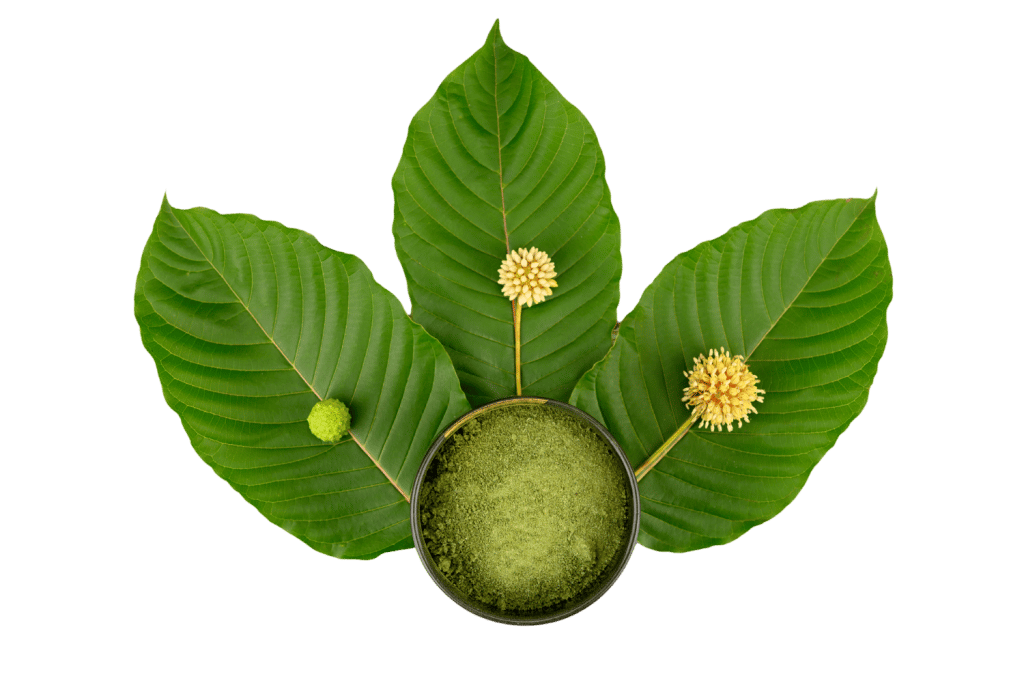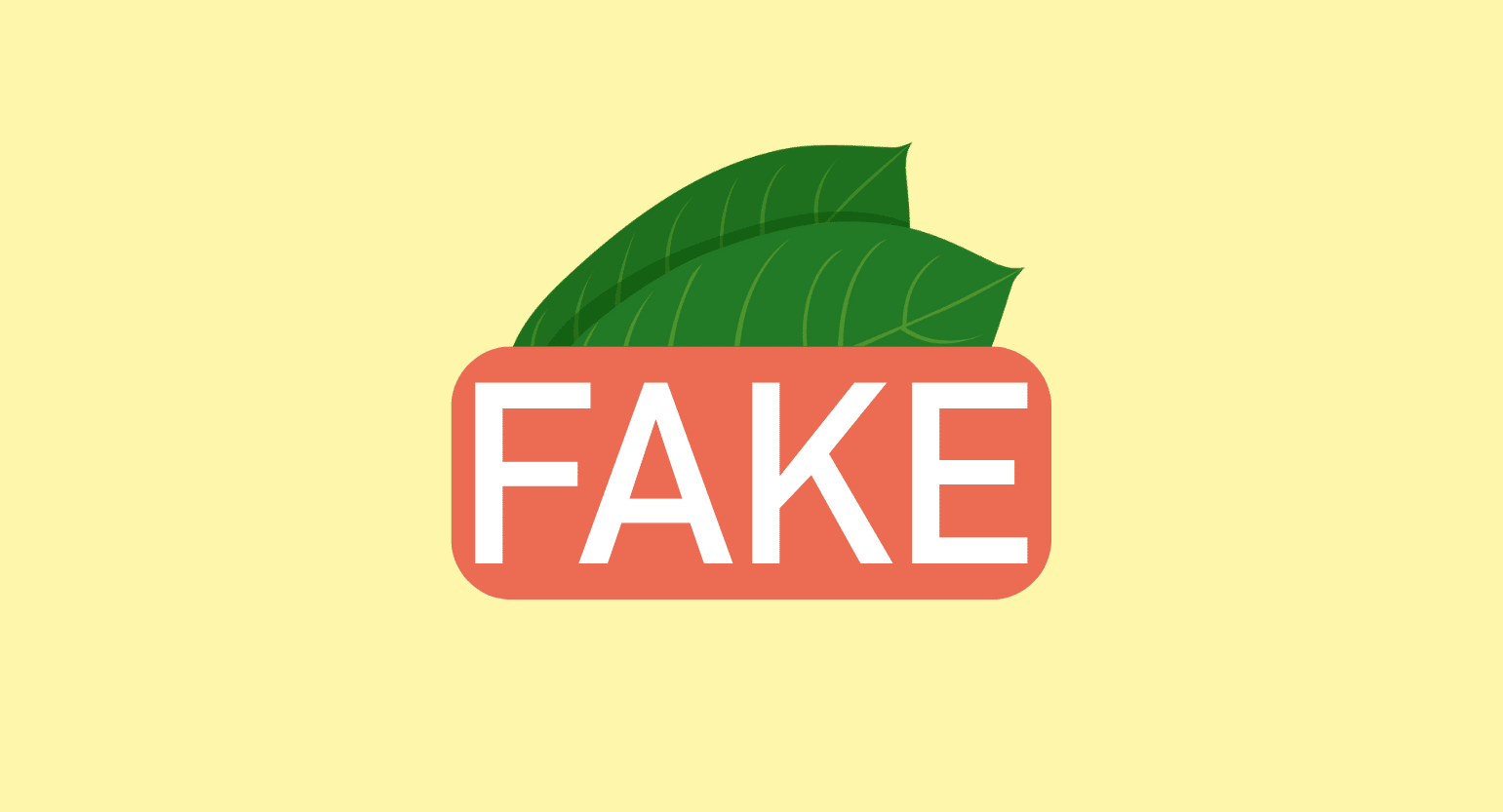What Is Fake Kratom?
Real kratom (Mitragyna speciosa) is a plant found in Southeast Asia. People use it for its wide variety of effects. It’s natural, full of alkaloids, and generally safe.
Fake kratom can mean a few different things, but the most common way people use it is when they mean to say “low-potency” kratom.
Companies may sell extremely low potency products containing few or no alkaloids at all and pass them off as regular-strength kratom products. Alkaloids give kratom its psychoactive effects, and without them, kratom has little to no benefit or desirable effects.
Other people say fake kratom means products that contain contaminants like heavy metals or pesticides that have “passed” third-party lab tests.
Kratom can easily become contaminated during the growing period, and some companies sell knowingly tainted kratom to avoid losing money. This fake kratom may contain legitimate, potent kratom but can be dangerous to consume.
Another possible use for the phrase “fake kratom” is to describe old, expired kratom that’s sold as a fresh product. Kratom has a shelf life, and less reputable businesses often sell stale kratom as if it were new to avoid wasting their supply and losing money. Expired kratom is less effective than fresh kratom and won’t have nearly the same intensity.
Funny enough, fake kratom rarely refers to products sold under the kratom label that doesn’t contain any kratom. Even the most nefarious companies aren’t bold enough to try to mislead their customers by selling a completely foreign substance packaged as kratom.
Why Is Some Kratom Fake?
Unfortunately, some people view the rise of kratom’s popularity as nothing more than an opportunity to take advantage of a fledgling, unregulated industry. Kratom has become significantly more mainstream, and the increased attention attracts people looking to capitalize on its popularity to make a quick buck.
Since kratom is unregulated, there are no official practices that kratom companies must follow and no regulatory body to enforce quality and safety standards.
A few states regulate kratom, but there’s still a lot of room for shady dealers.
Nothing prevents kratom companies from cutting corners and selling low-quality, low-purity, or even dangerous kratom products without a centralized regulatory agency.

How Do You Avoid Fake Kratom?
Luckily, there are ways to insulate yourself against the risk of accidentally purchasing fake kratom. Reputable kratom vendors exist that sell high-quality products that are safe and effective to use.
Here are some tips for finding high-quality, potent, and safe kratom.
1. Buy From a Reputable Vendor
The absolute best way to avoid fake kratom is to buy it from a reputable vendor. That sounds easier said than done, but it’s pretty easy to find reliable kratom retailers.
It all comes down to doing some homework before you buy. A few hours investigating a company’s background before opening up your wallet can save you money and ensure that what you’re buying is genuine kratom.
If you’re unsure about a vendor or don’t know where to start, you can check out our vendor guides for more information.
2. Look for AKA Certification
One of the easiest ways to tell if a kratom vendor is legit is to see if it has certification from the American Kratom Association (AKA). The AKA is an independent organization that audits kratom businesses to test their products for potency, purity, and contamination.
Companies must submit to random annual tests and exceed certain quality thresholds to maintain AKA certification. Any company that fails to uphold the standards set by the AKA loses its accreditation and cannot reapply.
Buying from an AKA-certified vendor is the best way to ensure you don’t get scammed into buying low-quality or dangerous kratom.
3. Look for Information on Sourcing & Processing
Reputable kratom retailers are happy to share information about where their products come from and how they’re processed. Any vendor that doesn’t publish information about the source of its products should happily supply it on request. Reputable vendors will be happy to answer questions and provide any requested information, so don’t hesitate to shoot an email to a company you’re considering.
A red flag is not publishing sourcing and processing information and refusing to supply it when asked.
Third-Party Lab Results
Third-party lab results are non-negotiable when buying an unregulated product like kratom. Conscientious kratom vendors send samples of their products to independent laboratories for testing to confirm potency, check for contaminants, and determine their purity.
Reputable kratom businesses often publish third-party lab results alongside their products on the company website, making it easy for customers to verify that they are accurately labeled and safe to use.
Less often, companies will send lab reports via email upon request. Having third-party lab results is a good thing, but not publishing them openly on the company website is cause for suspicion. If a company doesn’t have third-party test results, you should probably steer clear and look for another vendor.
Positive Online Reviews
Checking reviews can be a great way to judge a company, but it’s easy to be fooled by fake reviews. A good rule is to check as many sources as possible when scouting a company’s reviews. The more places with positive reviews, the more likely it is that the reviews are genuine and not seeded by the company itself.
Forums and message boards like Reddit are especially good for hearing what actual customers say about a business. It’s harder for companies to saturate large, external websites with fake reviews, and users often call out any nefarious activity.
A Professional Website
This tip is more open for interpretation than the others but is still essential. A professional website that’s easy to use, clean, and full of helpful information is a sign of a company that’s dedicated to its craft. People who care about their customers and run reputable businesses put time and effort into their company’s image, while scammers and con artists usually do the bare minimum to get by.
At the very least, you should look for a website that contains an About Page and a Mission Statement. Companies that want to forge genuine connections with customers put significant effort into telling the world about company ideals. A company without any background information that doesn’t appear to have any motivation for pursuing its business is less likely to be legitimate.
The bottom line is to trust your gut; if something doesn’t feel right about a vendor’s website, consider looking for another company.

4. Only Buy Directly From the Vendor
Sometimes people decide to purchase kratom from a third-party site like eBay, but this is seldom a good idea. It’s far too easy for a scammer to assume the identity of a reputable business and use its reputation to sell fake kratom on another site. This is especially tricky since the usual techniques people use to verify a company’s legitimacy will all check out, even though the person behind the listing is selling fake kratom.
The easiest way to avoid these scams is to always buy directly from the vendor’s website.
Another helpful tip is to purchase kratom from U.S vendors. Indonesian kratom retailers often try to entice customers with lower prices and products “directly from the source.” Still, most Indonesian sellers don’t put their products through rigorous testing the way U.S vendors do. It’s best to buy from a U.S.-based vendor that has sourced kratom from Indonesia and carried out third-party testing.
5. Consider Online Kratom Vendors
Buying kratom online is the best way to ensure you’re getting the highest-quality products available. Online retailers are more likely to have readily accessible third-party lab results, making them far safer than brick-and-mortar shops.
Most online kratom vendors have a close relationship with one or more suppliers, making them more aware of where their product comes from and how it’s handled before it reaches their warehouse. It also makes them more in tune with their products and better able to detect changes, saving themselves and their customers from suppliers whose product changes over time.
Buying online also affords you several other advantages over buying from a local shop. Online kratom vendors often have lower prices despite selling higher quality products. They also usually have more comprehensive selections, making trying rare strains and niche items easier.
6. Avoid Cheap Kratom
When money is tight, it can be tempting to go for the best deal you can find, and, sometimes, this is a good idea. However, buying the cheapest kratom around is a surefire way to walk into a fake kratom scam.
Kratom takes care and precision to harvest and process, so reputable sellers will start to lose money if they drop the price too low. The cheapest kratom you can find online or in-person is likely to be fake. It could be contaminated with harmful chemicals, potentially dangerous or weak, and a waste of money.
Is Fake Kratom Dangerous?
Not always, but it absolutely can be! Consuming fake kratom that contains dangerous chemicals, pesticides, or heavy metals can lead to serious illness or even death. The best outcome from buying fake kratom is that you waste some money on stale, low-potency kratom, but the worst result could be serious long-term health problems.

Wrapping Up: Avoiding Fake Kratom
Too many retailers take advantage of trusting customers and kratom’s surge in popularity to make money selling fake kratom. At best, fake kratom is weak and worthless, but at worst, it can be hazardous to your health or even deadly.
Avoiding fake kratom is about diligently researching kratom companies before giving them your hard-earned money. Reputable companies will have AKA certification, accessible third-party lab results, and professional websites full of helpful information. Suspicious websites without background information about the company or third-party lab results are a major red flag and a sign that a vendor may be selling fake kratom.
Shopping online is an easy way to find the necessary information about a company, including the test results.

